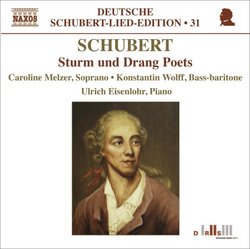| All Artists: Konstantin Wolff, Franz [Vienna] Schubert, Johann Rudolf Zumsteeg, Ulrich Eisenlohr, Caroline Melzer Title: Schubert: Sturm und Drang Poets Members Wishing: 0 Total Copies: 0 Label: Naxos Original Release Date: 1/1/2009 Re-Release Date: 4/28/2009 Genres: Dance & Electronic, Pop, Classical Styles: Vocal Pop, Chamber Music, Historical Periods, Classical (c.1770-1830) Number of Discs: 1 SwapaCD Credits: 1 UPC: 747313203673 |
Search - Konstantin Wolff, Franz [Vienna] Schubert, Johann Rudolf Zumsteeg :: Schubert: Sturm und Drang Poets
 | Konstantin Wolff, Franz [Vienna] Schubert, Johann Rudolf Zumsteeg Schubert: Sturm und Drang Poets Genres: Dance & Electronic, Pop, Classical |
Larger Image |
CD Details |
CD ReviewsExploring the Schubert Songs -- Sturm und Drang Robin Friedman | Washington, D.C. United States | 06/11/2009 (5 out of 5 stars) "It is a testament to Schubert's genius that, deep into this lengthy cycle of the complete Schubert songs (this CD is the 31st in an ongoing series), the lyricism, beauty and variety of the music continue to inspire. The budget-priced Naxos label is nearing the conclusion of its ambitious project of recording Schubert's over 600 lieder. The CDs are grouped in accordance with the poets who inspired the composer. Thus, this CD, titled "Sturm und Drang" features settings of poets who flourished during the brief period from about 1767 -- 1785, inspired by a return to subjectivity and romantic emotion in the works of dramatists and writers. There is substantial overlap in mood between this "Sturm und Drang" collection and other volumes in the Schubert cycle, including those volumes devoted to the composer's settings of Goethe, Schiller, and Romantic Poets.
The collection includes 17 songs performed by two young singers of promise. This CD is the first by soprano Caroline Melzer, who has won a variety of competitions and performed extensively in Europe and the United States. Bass-baritone Konstantin Wolff has other recordings to his credit. He has a broad repertoire in both opera and lieder. Melzer and Wolff are accompanied by pianist Ulrich Eisenlohr who also wrote the extensive program notes for the volume. Eisenlohr is the Artistic Advisor for this Naxos series. With the quality of the songs, the highly emotional singing, and Eisenlohr's accompaniment, this CD is one of the highlights of the Naxos Schubert cycle. For listeners wanting to explore the songs in depth, this recording includes Schubert's earliest completed work in this form, the rarely- performed and 15-minute long "Hagars Lament" written when the composer was 14. In an operatic and varied style, Schubert set a long poem by Clemens Schucking (1759-1790) based on the Biblical account of Hagar in the desert. Schubert used as a model a setting of Schucking's poem by a composer who is virtually forgotten today, one Johann Zumsteeg (1760 -- 1802). Ms Melzer performs both Schubert's and Zumsteeg's setting of "Hagars Lament." Schubert's indebtedness to the earlier composer is obvious, but so, in the shifting character of his music, its greater intensity, and its accompaniment, is Schubert's own gift. It is rare to hear this early effort of Schubert and even rarer to have the opportunity to compare it to its model. From Schubert's earliest effort in song, this CD also goes to one of his latest: the setting of the old Scottish ballade "Edward", D. 923 which Schubert set in September, 1827, months before his death. Schubert set this work three times, and the second setting is included on this CD. The "Edward" ballade is the only work on this recording in which Melzer and Wolff sing together. The "Edward" ballade was later set by Brahms in a famous work for piano solo. Schubert's setting captures the seething tension and hate between a medieval mother and her errant son who, at the mother's connivance, has murdered his father. The remaining songs in this collection feature Scubert's settings of two poets, Johann Jacobi (1740 -- 1814) and Christian Daniel Schubart (1739 -- 1791). Schubert's settings of both poets are melting in their simplicity and in their flowing lyricism. The best-known of Schubert's Jacobi settings is "All Soul's Day" D.343, which prays for those "who never laughed with the sun,/ and lay awake on thorns under the moon." Wolff and Eisenlohr collaborate beautifully on this song as well as on the far lesser-known settings of the slow ballad, "At midnight", D. 464, and the almost operatic setting of the Orpheus story, "The Song of Orpheus", D. 474. Melzer performs on a parabolic setting of "The Pearl", D.466 and on the simple "Wedding Song", D.463. The most famous of the Schubart settings is "Die Forelle" -- "the Trout" which Schubert used later as part of his famous string quintet of the same name. Schubert set this poem five times, and it is the fourth version, D. 550, which Melzer performs here. This setting differs from the others in its lack of an opening prelude for the piano. The remaining Schubart selections include Melzer's performance of "To my Piano", D. 343, a slight sentimental song that celebrates music-making on the piano (a subject dear to my heart), and two dark songs of death, "Epitaph for a Soldier", D. 454, and "To Death", D.518, sung by Wolff. The CD also includes two settings of texts by unknown poets and a setting by the English poet "Ossian" (James McPherson) of a sadly romantic ballad called "Lorna" D.327, performed by Wolff. There is little in music that can move the heart as readily as the songs of Schubert. They can be enjoyed either by simply hearing the flow of the melody, accompaniment and singing, or by close listening, with text in hand. The Naxos series offers the opportunity to enjoy Schubert's songs in detail, beyond the relatively few works that are recorded frequently. This CD and the series are outstanding ways to get to know Schubert. Texts and translations for the songs are not included with the CD, but they are available on the Naxos website. Robin Friedman " |
